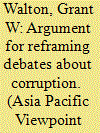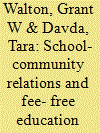|
|
|
Sort Order |
|
|
|
Items / Page
|
|
|
|
|
|
|
| Srl | Item |
| 1 |
ID:
119918


|
|
|
|
|
| Publication |
2013.
|
| Summary/Abstract |
There have been few attempts to identify the way different perspectives of corruption are employed in Papua New Guinea (PNG). The paucity of such analysis makes it difficult to identify the way scholars and policy-makers understand corruption in the country, in turn leading to potentially poor targeting of anti-corruption programmes. This article categorises perspectives of corruption that are found in academic and policy accounts of PNG. It finds that this literature is marked by an over-reliance on 'mainstream' Western interpretations of the definition, causes and solutions to corruption. In turn, it is argued that there is an important role that 'critical' and culturally aware academics can play in reframing debates about corruption in PNG and the Pacific.
|
|
|
|
|
|
|
|
|
|
|
|
|
|
|
|
| 2 |
ID:
176482


|
|
|
|
|
| Summary/Abstract |
Two theoretical frameworks frame the spatial dimensions of organised crime. The first, which has shaped international responses to the problem, stresses the scalar and territorial nature of the problem; the second (and recently emerging) has drawn on network theories to suggest that organised crime is ascalar and operates through fluid relationships between people, places and things. We suggest that these viewpoints tend to bifurcate scalar and flat ontologies and argue that understanding and responding to organised crime requires engaging with theories of scale and networks simultaneously. We bring this theoretical insight to bear on a case study: we examine the way state power has shaped organised crime and responses to it across the Pacific. The case study highlights that responses to organised crime are by and large driven by scalar and state‐based responses, which have been shaped by political power. In contrast, organised crime constitutes networked relations that are significantly shaped by administrative and political scales. The paper argues that the disjuncture between the nature of responses to organised crime helps perpetuate the problem. It also highlights the advantages of greater dialogue between scalar and networked theories of organised crime.
|
|
|
|
|
|
|
|
|
|
|
|
|
|
|
|
| 3 |
ID:
163468


|
|
|
|
|
| Summary/Abstract |
While international and Pacific scholarship suggests that communities can play a significant role in improving access to schooling as well as school funding, infrastructure, and resources, there is little research on how school-community relations shape the implementation of fee-free education policies. This is particularly the case in the Pacific region. In Papua New Guinea, communities play a significant role in determining school funding, infrastructure, and access, but their role in implementing the country's fee-free education policy (introduced in 2012) is poorly understood. Drawing on data from two provinces with very different capacities for service delivery, this paper shows that school-community relations vary significantly, and are crucial for managing challenges associated with the country's tuition fee-free (TFF) policy, particularly in regards to access to schooling and improving school funding, infrastructure, and resources. While communities have helped advance the TFF policy's goals, conflict over land, the charging of fees, and the board of management (BOM)—a key local governance body—has, in some cases, undermined national efforts to increase enrollments and make up for the loss of school income from tuition fees. This paper argues that academics and policy makers need to pay greater attention to the sustainability of fee-free education policies, geographical variation, and the improvement of school-community relations. Doing so will require overcoming the tendency to focus on national-level indicators of success associated with fee-free education policies.
|
|
|
|
|
|
|
|
|
|
|
|
|
|
|
|
|
|
|
|
|